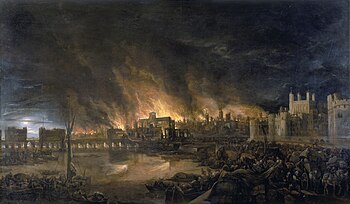On this day in 1666, the Great Fire of London is finally put out.
In the 1660s, London had an estimated half million inhabitants, more than ten times that of the next largest city in England. Unfortunately, many of them lived within the confines of the old defensive city walls in wooden buildings which pretty much sat one on top of another along very narrow streets.
On Sunday, September 2nd, just after midnight, a fire broke out at Thomas Farriner's bakery. As the city's militia fought the fire (there was not a dedicated fire department in those days) the mayor was called in to approve demolition of the surrounding buildings to prevent the fire from spreading (since firefighting techniques were crude, often demolition of buildings was the most effective means to put out a fire). The mayor declared it unnecessary and left the scene. On Sunday morning the winds picked up and over 300 houses were consumed in flames.
By Sunday afternoon, all attempts to put out the fire had been forsaken, and the wind fueled the fire which spread throughout the city. Although a good portion of the city was now on fire, the city's inhabitants kept leaving their homes for safer places in the city, but still within the city's 18ft high defensive wall.
By Monday the fire was so widespread there was absolute panic in the city and the residents began to flee for one of the eight gates that opened out of the wall. London's most fashionable shops were now burned to the ground and King Charles II put his brother James, The Duke of York, in charge of firefighting operations.

Tuesday saw the most destruction as the fire crossed the firebreaks constructed by The Duke of York at the Fleet River and another firebreak to the north was breeched and the affluent section of Cheapside and St. Paul's Cathedral were lost to the flames. By late Tuesday, the winds had died down, the remaining firebreaks were able to hold and the fire ceased to spread.
On Wednesday morning, most of the city lay smoldering. The fire had consumed 13,200 houses. 70,000 people were left homeless, most with little or no possessions left.
On this day in 1698, after visiting the west, Tsar Peter I returns to Russia very impressed with western society and imposes a tax on beards for all men except the clergy and peasantry.
Certain members of the nobility (at whom the tax was pointed) wanted to keep their beards and would pay the pretty hefty tax. To prove they had paid, they were issued this coin.


The Historical Inebriant: The Fuzzy Russian
Ingredients:
In the 1660s, London had an estimated half million inhabitants, more than ten times that of the next largest city in England. Unfortunately, many of them lived within the confines of the old defensive city walls in wooden buildings which pretty much sat one on top of another along very narrow streets.
On Sunday, September 2nd, just after midnight, a fire broke out at Thomas Farriner's bakery. As the city's militia fought the fire (there was not a dedicated fire department in those days) the mayor was called in to approve demolition of the surrounding buildings to prevent the fire from spreading (since firefighting techniques were crude, often demolition of buildings was the most effective means to put out a fire). The mayor declared it unnecessary and left the scene. On Sunday morning the winds picked up and over 300 houses were consumed in flames.
By Sunday afternoon, all attempts to put out the fire had been forsaken, and the wind fueled the fire which spread throughout the city. Although a good portion of the city was now on fire, the city's inhabitants kept leaving their homes for safer places in the city, but still within the city's 18ft high defensive wall.
By Monday the fire was so widespread there was absolute panic in the city and the residents began to flee for one of the eight gates that opened out of the wall. London's most fashionable shops were now burned to the ground and King Charles II put his brother James, The Duke of York, in charge of firefighting operations.

Tuesday saw the most destruction as the fire crossed the firebreaks constructed by The Duke of York at the Fleet River and another firebreak to the north was breeched and the affluent section of Cheapside and St. Paul's Cathedral were lost to the flames. By late Tuesday, the winds had died down, the remaining firebreaks were able to hold and the fire ceased to spread.
On Wednesday morning, most of the city lay smoldering. The fire had consumed 13,200 houses. 70,000 people were left homeless, most with little or no possessions left.
_____________________________________________________________________
On this day in 1698, after visiting the west, Tsar Peter I returns to Russia very impressed with western society and imposes a tax on beards for all men except the clergy and peasantry.
Certain members of the nobility (at whom the tax was pointed) wanted to keep their beards and would pay the pretty hefty tax. To prove they had paid, they were issued this coin.

Ingredients:
2 oz. Peach Schnapps
1 oz. Absolut Mandarin Vodka
5 oz. Orange Juice
1 slice Kiwi
Place the vodka in small, chilled glass. Add half of orange juice. Then, add the peach schnapps and pour into larger glass with the rest of the orange juice. Garnish with one slice of kiwi.
No comments:
Post a Comment
Post Comment: